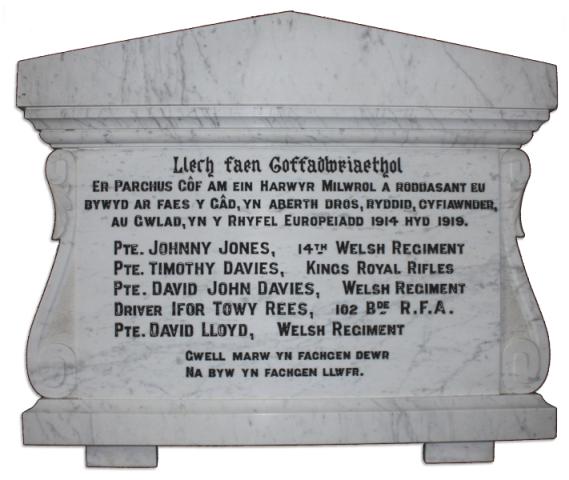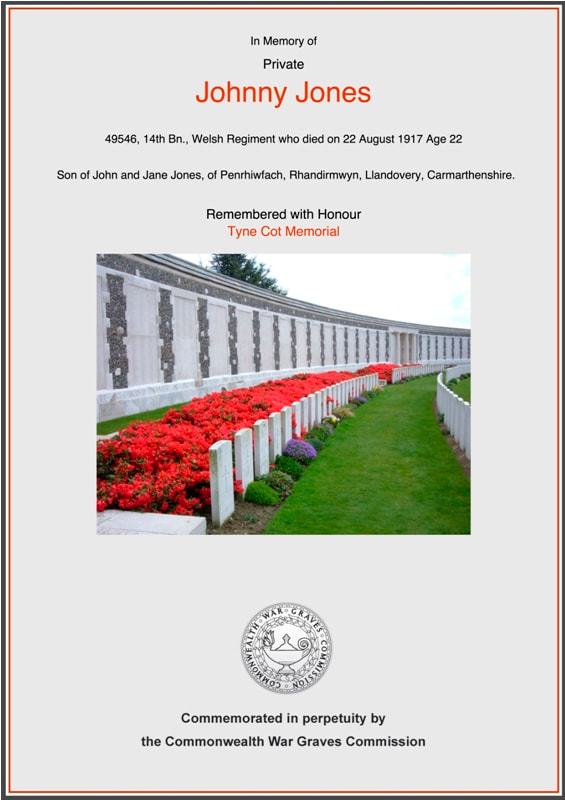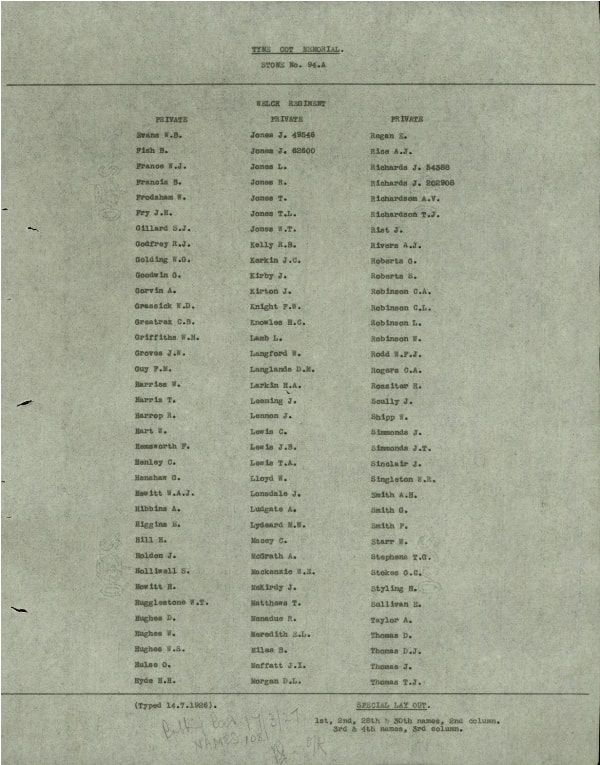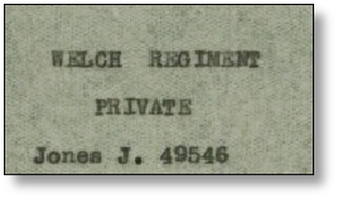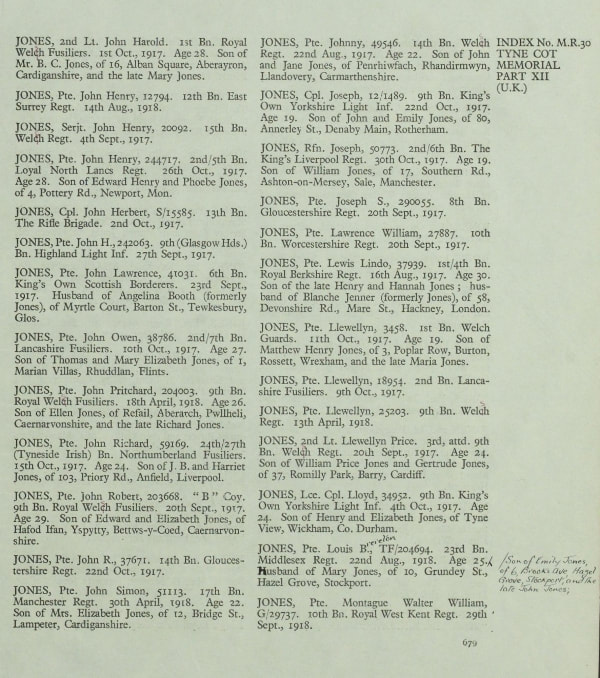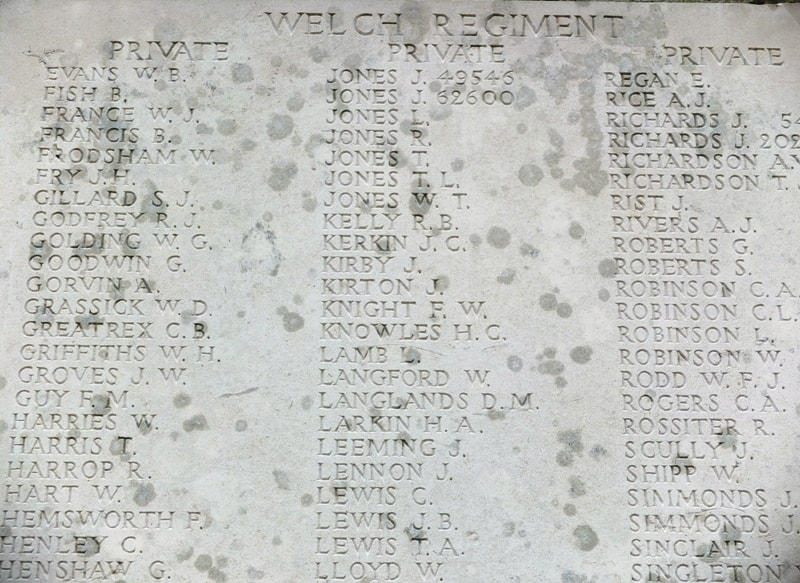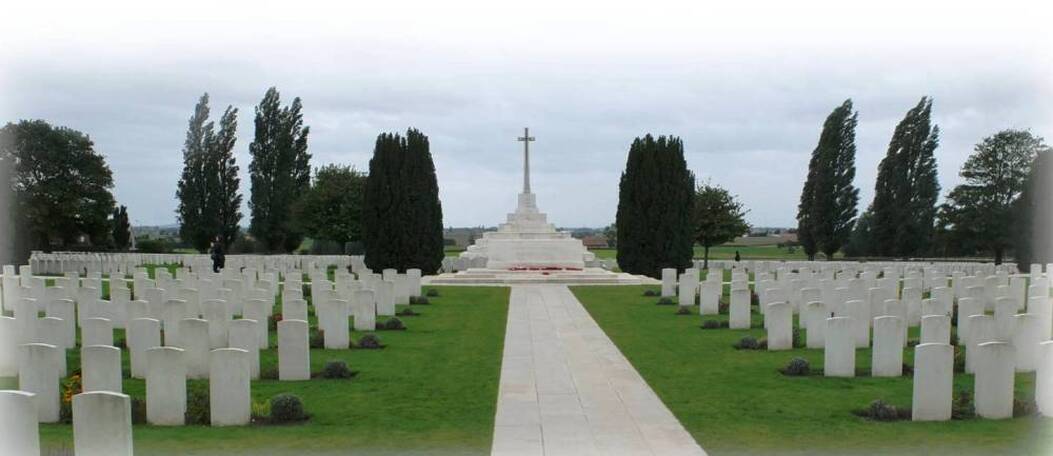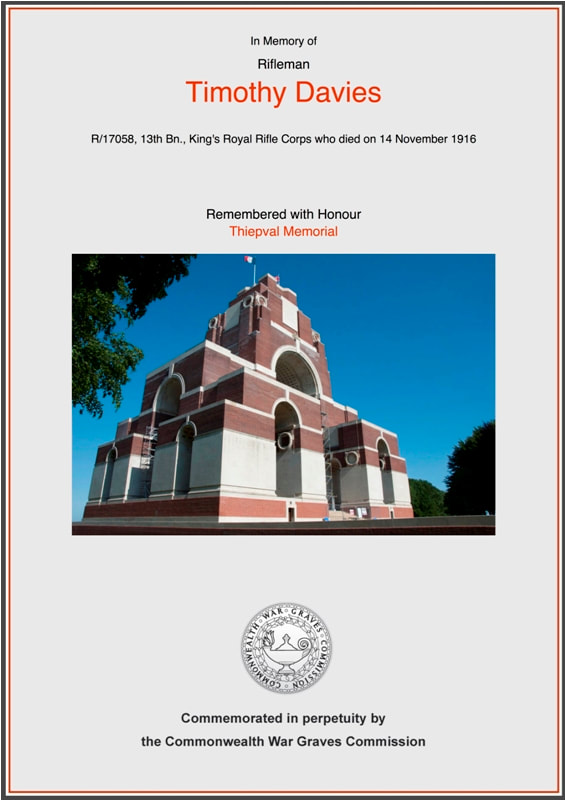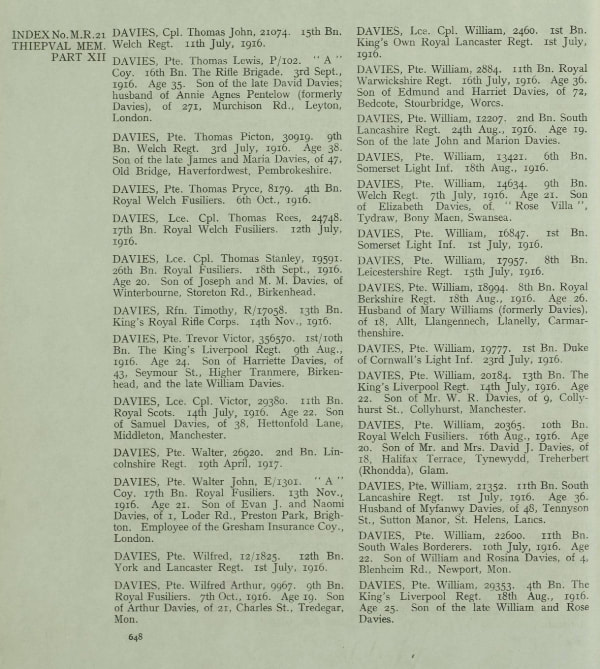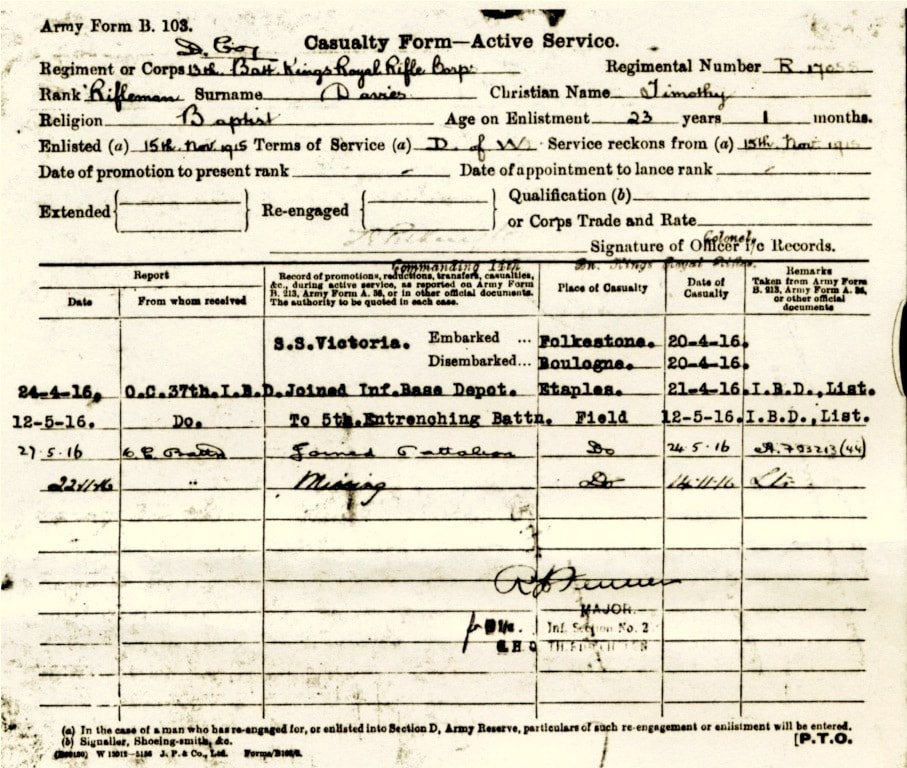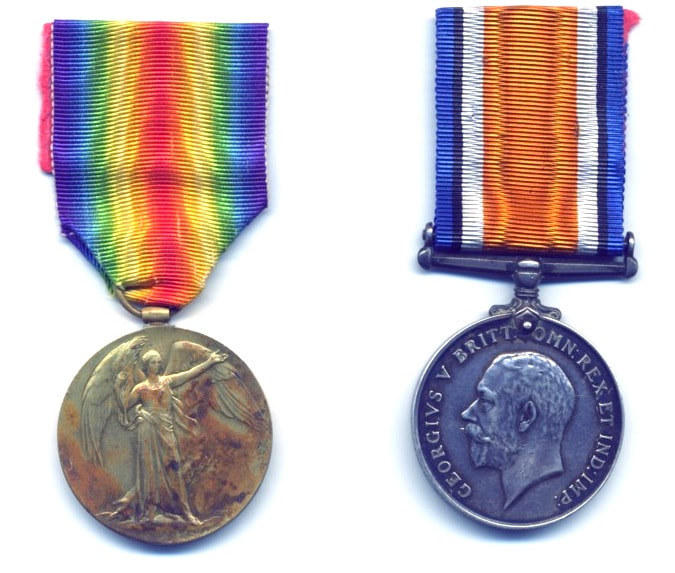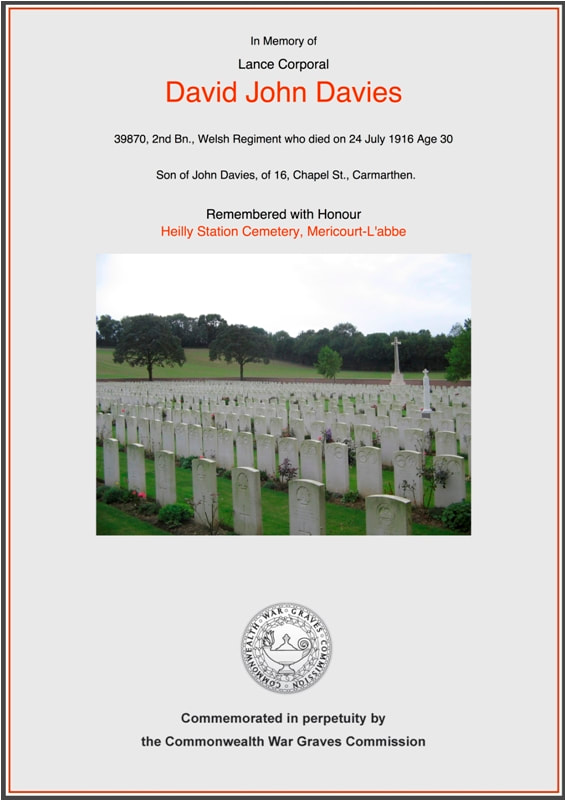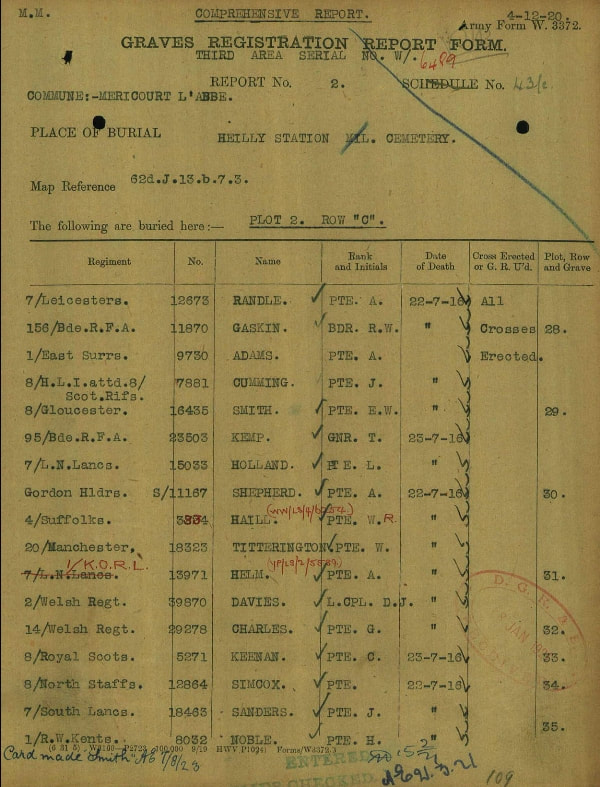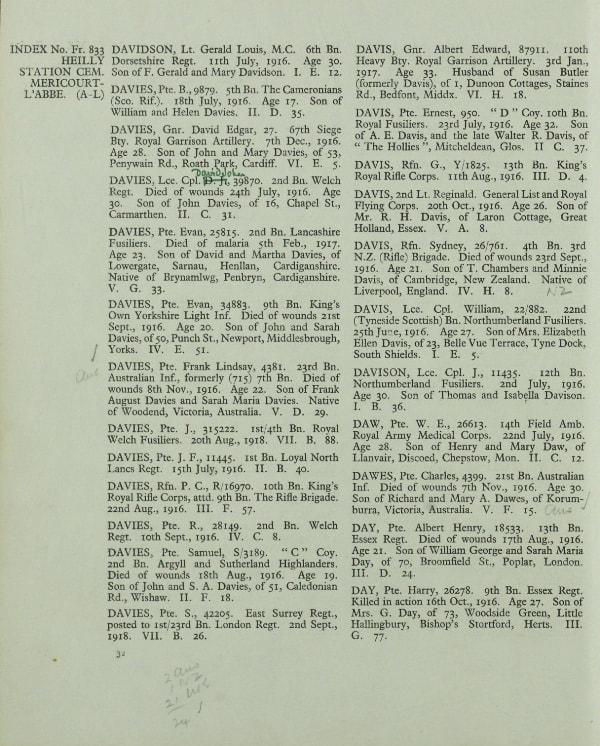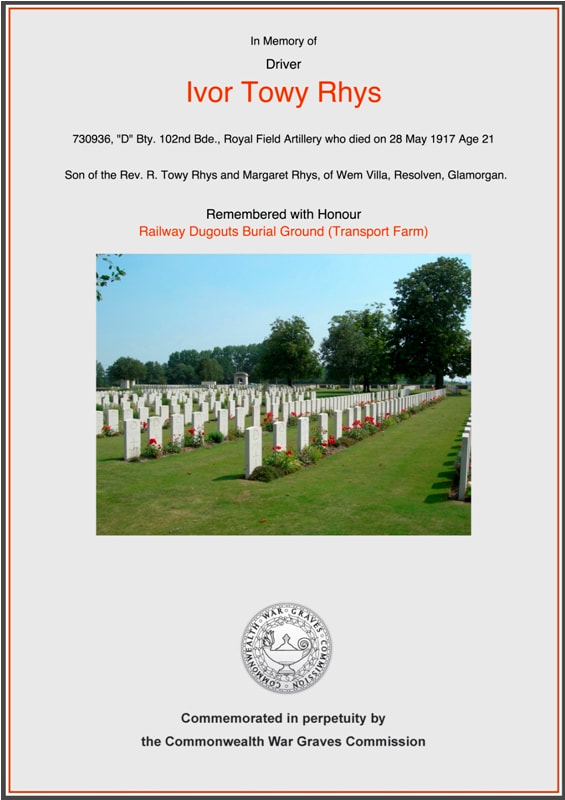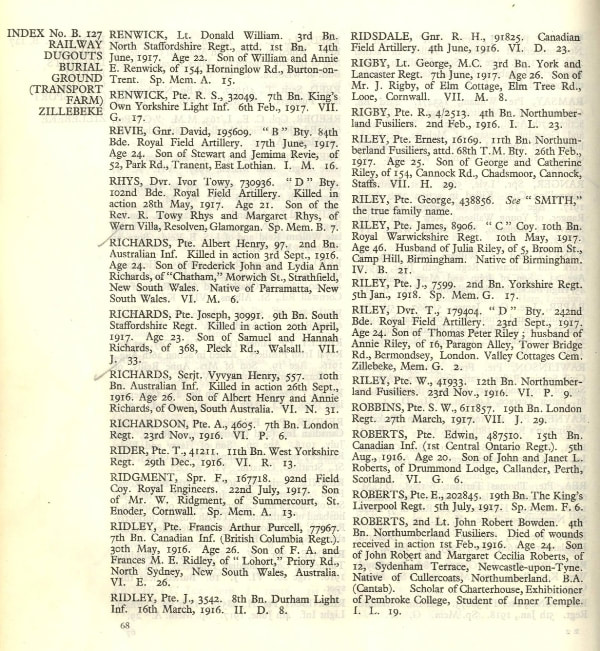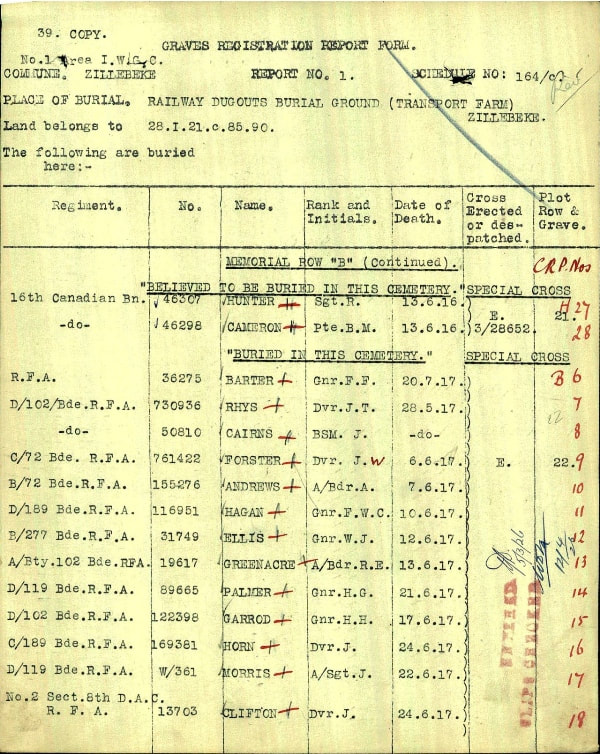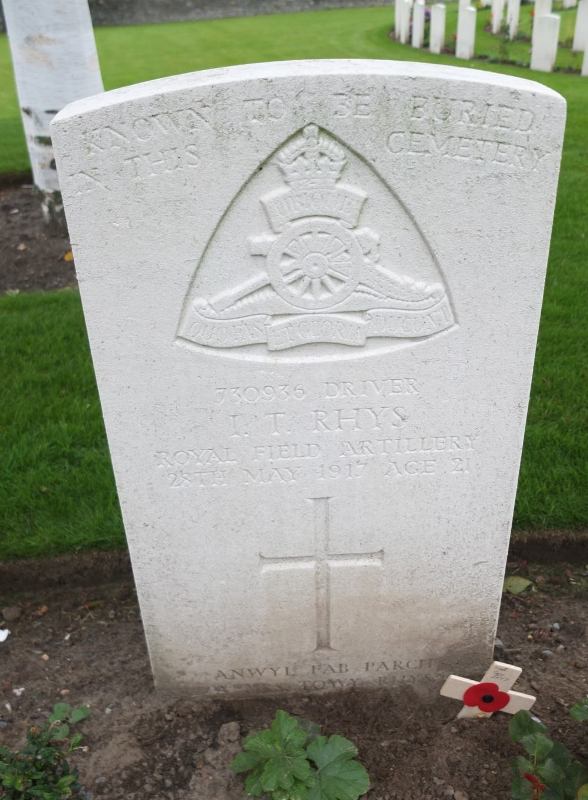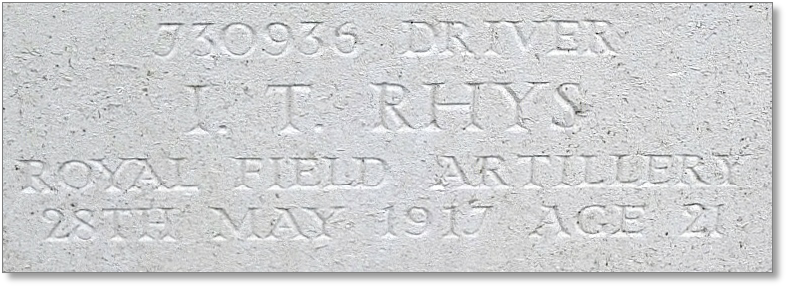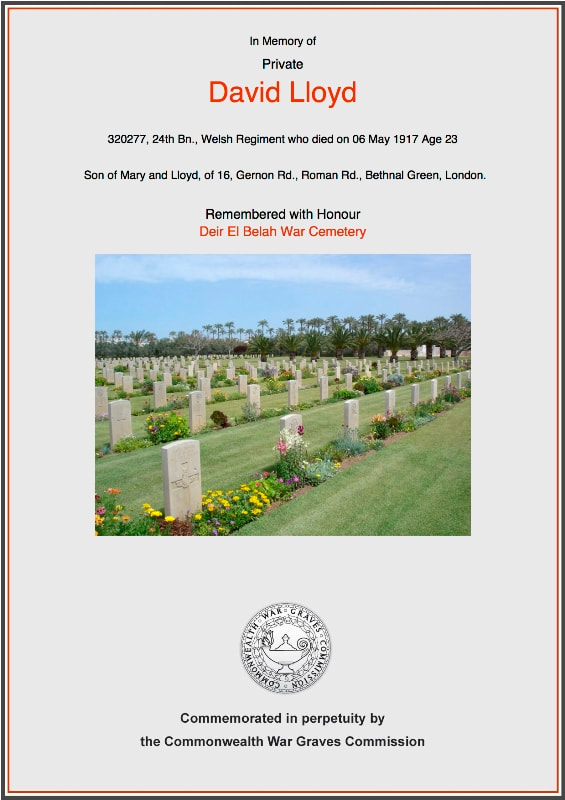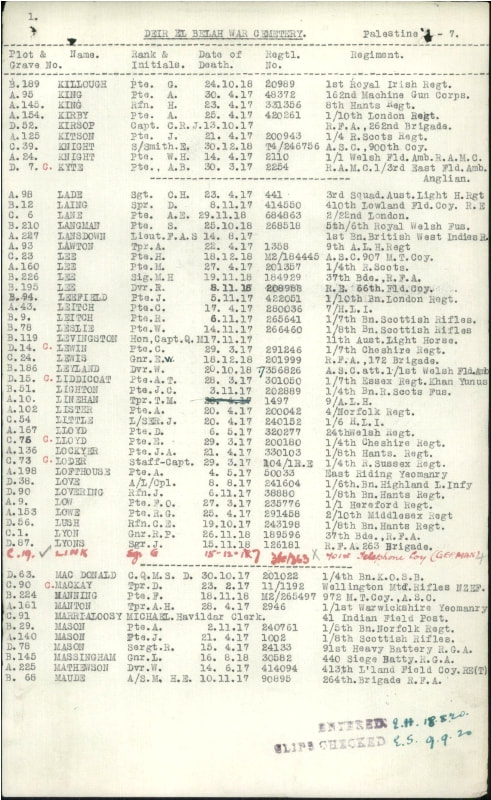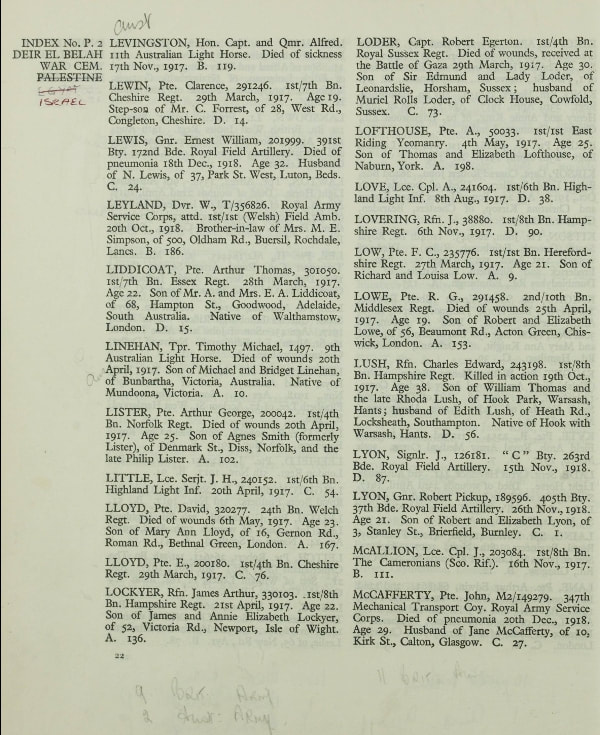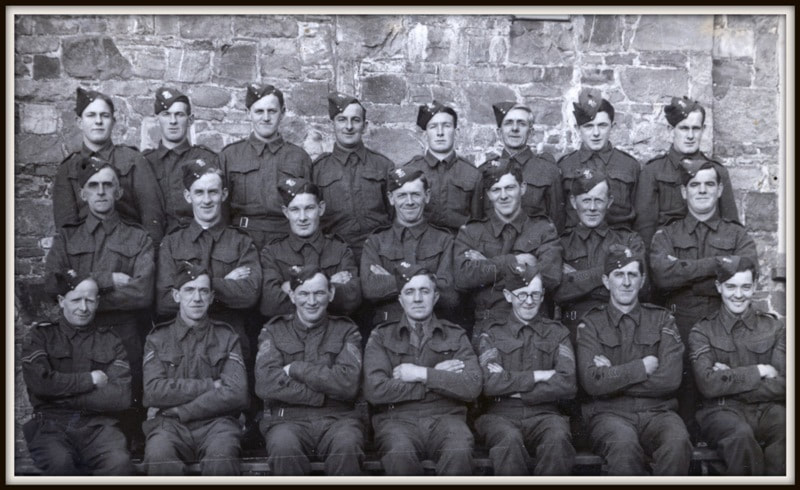World War One
LEST WE FORGET
A tribute to the Rhandir-mwyn men who lost their lives on foreign soil in valiant defence of our country. Their names are carved on memorials, both locally and far from home.
The memorial plaque is now on the wall of St Barnabas Church having been moved from its original location in Salem chapel. (Salem chapel was deconsecrated in 1994).
The memorial plaque is now on the wall of St Barnabas Church having been moved from its original location in Salem chapel. (Salem chapel was deconsecrated in 1994).
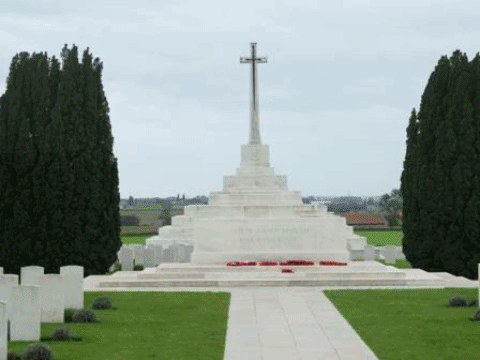
Names
● PTE Johnny Jones
● PTE Timothy Davies
● PTE David John Davies
● Driver Ifor Towy Rees
● PTE David Lloyd
Read: Letter from our defenders by David Vincent Lewis,
● PTE Johnny Jones
● PTE Timothy Davies
● PTE David John Davies
● Driver Ifor Towy Rees
● PTE David Lloyd
Read: Letter from our defenders by David Vincent Lewis,
PTE Jonny Jones
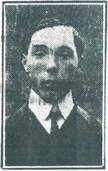
PRIVATE JOHNNY JONES, WELSH REGIMENT.
Johnny Jones, Private, Welsh Regiment, was the only son of John and Jane Jones, of Penrhiw-fach, Rhandir-mwyn. Prior to enlisting at Llandovery, this highly respected young man was a haulier to Mr James, Nant-bai Stores, Rhandir-mwyn. In July 1917, after completing military training in Rhyl, he was allowed his first leave at home. A warm welcome awaited him when he attended a presentation evening for Gunner David Rees, Royal Field Artillery, who was recuperating from wounds. Shortly afterwards, on 31 July 1917, Johnny fought in the initial attack in the Battle of Pilckem Ridge. Although he survived the main assault, when his Division captured all its objectives, he was killed in action at Langemarck on 22 August 1917, aged 24. Johnny has no known grave, and is commemorated on the Tyne Cot Memorial, Belgium.
Johnny Jones, Private, Welsh Regiment, was the only son of John and Jane Jones, of Penrhiw-fach, Rhandir-mwyn. Prior to enlisting at Llandovery, this highly respected young man was a haulier to Mr James, Nant-bai Stores, Rhandir-mwyn. In July 1917, after completing military training in Rhyl, he was allowed his first leave at home. A warm welcome awaited him when he attended a presentation evening for Gunner David Rees, Royal Field Artillery, who was recuperating from wounds. Shortly afterwards, on 31 July 1917, Johnny fought in the initial attack in the Battle of Pilckem Ridge. Although he survived the main assault, when his Division captured all its objectives, he was killed in action at Langemarck on 22 August 1917, aged 24. Johnny has no known grave, and is commemorated on the Tyne Cot Memorial, Belgium.
PTE Timothy Davies
PRIVATE TIMOTHY DAVIES, KING'S ROYAL RIFLES
Timothy Davies, Private, King's Royal Rifle Corps, was born in 1892, the son of Thomas and Margaret Davies, of Cwrdinas, Rhandi-mwyn. He enlisted at Llandovery in November 1915 and arrived in France the following April. In July and August 1916, he saw action in the battles of the Somme campaign, at Bazentin, Pozières and Flers-Courcelette. Later that year, his Division played an important role during the capture of Beaucourt. Timothy was reported as missing presumed wounded on 14 November 1916, but was afterwards declared killed in action that day. He was 24 years old, and is remembered on the Thiepval Memorial, France.
Timothy Davies, Private, King's Royal Rifle Corps, was born in 1892, the son of Thomas and Margaret Davies, of Cwrdinas, Rhandi-mwyn. He enlisted at Llandovery in November 1915 and arrived in France the following April. In July and August 1916, he saw action in the battles of the Somme campaign, at Bazentin, Pozières and Flers-Courcelette. Later that year, his Division played an important role during the capture of Beaucourt. Timothy was reported as missing presumed wounded on 14 November 1916, but was afterwards declared killed in action that day. He was 24 years old, and is remembered on the Thiepval Memorial, France.
PTE David John Davies
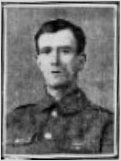
PRIVATE DAVID JOHN DAVIES, WELSH REGIMENT
David John Davies, Private, Welsh Regiment, was the son of John and Susan Davies, of 16, Chapel Street, Carmarthen, and was a postman in Rhandir-mwyn. After enlisting at Llandovery, he was posted to France early in 1916. David was wounded on the Somme, during the Battle of Pozières, and died of his wounds on 24 July 1916, aged 30. He is buried at Heilly Station Cemetery, Méricourt-l'Abbé, France.
David John Davies, Private, Welsh Regiment, was the son of John and Susan Davies, of 16, Chapel Street, Carmarthen, and was a postman in Rhandir-mwyn. After enlisting at Llandovery, he was posted to France early in 1916. David was wounded on the Somme, during the Battle of Pozières, and died of his wounds on 24 July 1916, aged 30. He is buried at Heilly Station Cemetery, Méricourt-l'Abbé, France.
Driver Ifor Towy Rhys
DRIVER IVOR TOWY REES, ROYAL FIELD ARTILLERY
Ivor Towy Rhys, Driver, Royal Horse Artillery and Royal Field Artillery, was born in Ystradgynlais in 1896, but had strong connections with the Upper Tywi Valley, His father, the Reverend Rhys Towy Rhys, a Calvinistic Methodist Minister, was born at Crincae, Rhandir-mwyn, and his mother, Margaret Jane, was a native of Cil-y-cwm. Ivor died in action, aged 21, on 28 May 1917 and is buried in Ypres, Belgium.
Ivor Towy Rhys, Driver, Royal Horse Artillery and Royal Field Artillery, was born in Ystradgynlais in 1896, but had strong connections with the Upper Tywi Valley, His father, the Reverend Rhys Towy Rhys, a Calvinistic Methodist Minister, was born at Crincae, Rhandir-mwyn, and his mother, Margaret Jane, was a native of Cil-y-cwm. Ivor died in action, aged 21, on 28 May 1917 and is buried in Ypres, Belgium.
PTE David Lloyd
PRIVATE DAVID LLOYD, WELSH REGIMENT
David Lloyd, Private, Welsh Regiment, was the son of Mary Lloyd, 16, Gernon Road, Roman Road, Bethnal Green, London. He worked as a farm servant at Penrhiw'ronnen, Rhandir-mwyn, and enlisted at Carmarthen into the Pembroke Yeomanry, which later merged with the Glamorgan Yeomanry to form the 24th Battalion, Welsh Regiment. In March 1916, he sailed for Egypt, and was wounded during the Third Battle of Gaza. He died of his wounds on 7 May 1917, aged 23, and is buried at Deir El Belah War Cemetery.
David Lloyd, Private, Welsh Regiment, was the son of Mary Lloyd, 16, Gernon Road, Roman Road, Bethnal Green, London. He worked as a farm servant at Penrhiw'ronnen, Rhandir-mwyn, and enlisted at Carmarthen into the Pembroke Yeomanry, which later merged with the Glamorgan Yeomanry to form the 24th Battalion, Welsh Regiment. In March 1916, he sailed for Egypt, and was wounded during the Third Battle of Gaza. He died of his wounds on 7 May 1917, aged 23, and is buried at Deir El Belah War Cemetery.
Letter from our defenders
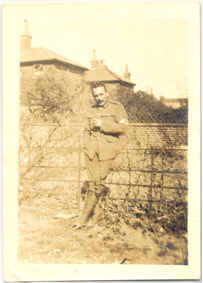
RHANDIRMWYN FATHER’S LETTER
David Vincent Lewis, Headmaster of Rhandirmwyn School (1904 – 1922)
Appending is an interesting letter sent to his children at School House, Rhandirmwyn, Llandovery, by a gallant father in the fighting line in France. Letters from him have before appeared in the JOURNAL under the signature of ‘D.V.L.’ :-
My dear Children
At last your Dad has time to write you a long letter. First let me thank you for your very long and interesting letters, which I enjoyed very very much. One question, which you all seem never tired of asking is, “What is the weather like. ” Well the weather is very much like the weather we have in Rhandir; sometimes it rains, sometimes it doesn’t; sometimes we have thunder; sometimes we don’t; sometimes it is very warm; sometimes it is very cold; the nights are always very cold.. Dad sleeps on the ground, the bumpiest ground in France, I believe; and it is nothing uncommon to keep awake for hours, rolling first to the right, then to the left, and in between trying to get some rest on your back. Presently you will hear some deep mutterings, increasing in volume with marvellous rapidity, - imprecations upon every little bump and hollow in France.
If it is impossible to go to sleep, then one can amuse himself by trying to count how many big guns are booming away there in the trenches, or trying to number the flashlights and rockets that the Huns light the earth with, trying to find out where our men are, and take them by surprise. Keep on steadily counting those big booms or lurid lights, and you will gradually find yourself “climbing the wooden stairs.”
Dad has not had much work this last week, as we work shifts at the hospital, and my turn doesn’t come again until next week. But, of course the day will come when the shifts will all have to work together, and then your grumbling old Dad will be grunting because there is too much work to do. You never know such a dissatisfied personage as your old Dad has become.
If there’s too much work – he grumbles. If there’s too little - he grumbles. If it’s too hot - he grumbles. If it’s too cold - he grumbles. If the Major walks too fast - he grumbles. If too slow - he grumbles. Always grumbling. The fact is that nothing will ever, ever, ever be right until he’s back with you all again and then, if he ever grumbles again, he deserves to be sent away so far from everybody, and be made to live for the rest of his life all by himself.
Now I’ve told you what this part of France is like: now I’ll tell you what the people are like.
Imagine, my children, Rhandirmwyn with soldiers always passing through stopping at the village for a week or so, and then off again, only to make room for others behind; all the time, all the time. Imagine these soldiers to be French soldiers, who were always laughing at you, and your (to them) ‘funny’ ways; robbing your orchards and gardens, making fun of your young girls and women, always grumbling and dissatisfied, and always saying that you were the dirtiest, silliest people on the face of God’s earth. Imagine too every day letters coming from the trenches not so far away, telling you that someone you love so much has been killed and buried, without you having so much as the chance ever to see him again; but still these French people in your house, or barn or pigs cot, always laughing, singing, joking, teasing, grumbling, but never, seemingly to understand.
Every day I see some poor old man or woman (there are no young men left, - they are all at the front), who perhaps, cannot read, come joyfully waving a letter to someone who can, and sometimes, my dears, I see, when the letter is being read, the lips of the old man or woman, or perhaps both, begin to tremble, oh! so sadly, so pitifully; it is not a letter to say that their son is strong and well: it is not a letter to say he is better; it is not a letter from him at all, but from one of his chums to say that he is dead. The pity of it, the pity of it, my own dears. The old man then has a far-away look in his eyes. Oh, I saw one such old man yesterday. He was old, so very old, and his wife seemed older, for she hobbled along on a stick. They came up to the farmhouse near us, and she clutched in her hands the greatest treasure, next to one, that God’s earth held for her - it was a letter from her son.
They trembled with joy, both of them for they were so sure it contained good news, sure, sure, sure that Le Bon Dieu would take care of their only boy – the brave fellow. From the farmhouse hobbled another old woman, but not so old as the mother, and this last old dear was wise in the sight of the mother, for she could read. She smiled, then opened the letter, and started to read, but her voice failed, she seemed to be swallowing something, and then taking courage, she read the bitter, bitter truth. The son was dead.
Your Dad is but a thoughtless soldier, but he will never forget the scene. The mother’s head drooped upon her breast, oh! so sadly, and her hands groped blindly in front of her. They were seized so tenderly, so lovingly in the old man’s, but his head did not drop. His bent old back straightened, he threw his shoulders back, and through the tears streaming down his cheeks, he looked so proudly up to heaven. Then, hand in hand, they left the farmhouse, these two old people with broken hearts, and strive as he would, then brave old man’s shoulders would slacken, his head and back would stoop, but only the tiniest, weeniest bit, and his voice would quaver, but only ever so slightly, as he tried to comfort the love of his life, so stricken in grief.
Brave old man! Brave old woman!
Now, my kiddies can you understand the attitude of the people of France to us. At first, when the war began, they were so glad to see us, and so very extravagant in their joy. But seeing and hearing the same thing over and over again, day after day, month in month out, and the end of the war seeming as far off as ever, do you wonder that they are getting a bit tired of us? It is true that some of them do not bother their heads much about sanitation, but all the same they are the most industrious people on God’s earth.
Although the Germans are so near, these brave men and women, young and old and children, have the whole countryside looking like one big garden. Although all the strong young men, who used to do the heavy work, are away at the firing line, yet those left behind have not lost heart. Up to the very edge of the trenches themselves, these wonderful people have ploughed and sowed, and are now reaping. Sugar-beet, haricot beans, wheat, maize, flourish on every available inch. While some are cutting and reaping, the others with mules (for the horses are nearly all at the front), are busy turning the earth over to sow fresh crops.
The soldiers must have food, and they see to it that they shall have food, for they are at it from sunrise, not to sunset, but far on into moonlight.
They are wonderful, wonderful, wonderful, and when people of England and Wales are about half as unselfish and industrious, they will have earned the right to be proud of themselves. We at home plume ourselves on being industrious and good, and kind, but we haven’t a look in, and God will give the Allies victory, if only for the sake of the brave old men and women of Northern France whose hearts are filled with perpetual youth. Why my dears, they actually, these women whose hands tremble with age, they actually till the ground between and among the barbed wire entanglements, scratching their dear old hands in accomplishing their task. Further up the line a bit, where German shells burst far too often to be pleasant, the heroism of these old ladies has become perpetuated in a proverb, “ When it rains with shells the soldiers run indoors for safety, but the women run out of doors for the washing .”
Now, why have I told you all this. Parts of it, if I have told it well, will make you cry. Do I want my children to be sad? God forbid, but I do want my words to strike deep down into your hearts, so that you will strive to become such old men and women even as those of Northern France. Now, my dears its time for little boys to be off to bed, and soldiers have to go to bed at half past nine, so Dad must go to bed. If you like you may send this letter to the JOURNAL, for other boys and girls like you to read, that is if the Editor would like to publish once more stuff from D.V.L. Dad will try to write you a letter once a week. Be good, and mind look after you know whom. DAD.
David Vincent Lewis, Headmaster of Rhandirmwyn School (1904 – 1922)
Appending is an interesting letter sent to his children at School House, Rhandirmwyn, Llandovery, by a gallant father in the fighting line in France. Letters from him have before appeared in the JOURNAL under the signature of ‘D.V.L.’ :-
My dear Children
At last your Dad has time to write you a long letter. First let me thank you for your very long and interesting letters, which I enjoyed very very much. One question, which you all seem never tired of asking is, “What is the weather like. ” Well the weather is very much like the weather we have in Rhandir; sometimes it rains, sometimes it doesn’t; sometimes we have thunder; sometimes we don’t; sometimes it is very warm; sometimes it is very cold; the nights are always very cold.. Dad sleeps on the ground, the bumpiest ground in France, I believe; and it is nothing uncommon to keep awake for hours, rolling first to the right, then to the left, and in between trying to get some rest on your back. Presently you will hear some deep mutterings, increasing in volume with marvellous rapidity, - imprecations upon every little bump and hollow in France.
If it is impossible to go to sleep, then one can amuse himself by trying to count how many big guns are booming away there in the trenches, or trying to number the flashlights and rockets that the Huns light the earth with, trying to find out where our men are, and take them by surprise. Keep on steadily counting those big booms or lurid lights, and you will gradually find yourself “climbing the wooden stairs.”
Dad has not had much work this last week, as we work shifts at the hospital, and my turn doesn’t come again until next week. But, of course the day will come when the shifts will all have to work together, and then your grumbling old Dad will be grunting because there is too much work to do. You never know such a dissatisfied personage as your old Dad has become.
If there’s too much work – he grumbles. If there’s too little - he grumbles. If it’s too hot - he grumbles. If it’s too cold - he grumbles. If the Major walks too fast - he grumbles. If too slow - he grumbles. Always grumbling. The fact is that nothing will ever, ever, ever be right until he’s back with you all again and then, if he ever grumbles again, he deserves to be sent away so far from everybody, and be made to live for the rest of his life all by himself.
Now I’ve told you what this part of France is like: now I’ll tell you what the people are like.
Imagine, my children, Rhandirmwyn with soldiers always passing through stopping at the village for a week or so, and then off again, only to make room for others behind; all the time, all the time. Imagine these soldiers to be French soldiers, who were always laughing at you, and your (to them) ‘funny’ ways; robbing your orchards and gardens, making fun of your young girls and women, always grumbling and dissatisfied, and always saying that you were the dirtiest, silliest people on the face of God’s earth. Imagine too every day letters coming from the trenches not so far away, telling you that someone you love so much has been killed and buried, without you having so much as the chance ever to see him again; but still these French people in your house, or barn or pigs cot, always laughing, singing, joking, teasing, grumbling, but never, seemingly to understand.
Every day I see some poor old man or woman (there are no young men left, - they are all at the front), who perhaps, cannot read, come joyfully waving a letter to someone who can, and sometimes, my dears, I see, when the letter is being read, the lips of the old man or woman, or perhaps both, begin to tremble, oh! so sadly, so pitifully; it is not a letter to say that their son is strong and well: it is not a letter to say he is better; it is not a letter from him at all, but from one of his chums to say that he is dead. The pity of it, the pity of it, my own dears. The old man then has a far-away look in his eyes. Oh, I saw one such old man yesterday. He was old, so very old, and his wife seemed older, for she hobbled along on a stick. They came up to the farmhouse near us, and she clutched in her hands the greatest treasure, next to one, that God’s earth held for her - it was a letter from her son.
They trembled with joy, both of them for they were so sure it contained good news, sure, sure, sure that Le Bon Dieu would take care of their only boy – the brave fellow. From the farmhouse hobbled another old woman, but not so old as the mother, and this last old dear was wise in the sight of the mother, for she could read. She smiled, then opened the letter, and started to read, but her voice failed, she seemed to be swallowing something, and then taking courage, she read the bitter, bitter truth. The son was dead.
Your Dad is but a thoughtless soldier, but he will never forget the scene. The mother’s head drooped upon her breast, oh! so sadly, and her hands groped blindly in front of her. They were seized so tenderly, so lovingly in the old man’s, but his head did not drop. His bent old back straightened, he threw his shoulders back, and through the tears streaming down his cheeks, he looked so proudly up to heaven. Then, hand in hand, they left the farmhouse, these two old people with broken hearts, and strive as he would, then brave old man’s shoulders would slacken, his head and back would stoop, but only the tiniest, weeniest bit, and his voice would quaver, but only ever so slightly, as he tried to comfort the love of his life, so stricken in grief.
Brave old man! Brave old woman!
Now, my kiddies can you understand the attitude of the people of France to us. At first, when the war began, they were so glad to see us, and so very extravagant in their joy. But seeing and hearing the same thing over and over again, day after day, month in month out, and the end of the war seeming as far off as ever, do you wonder that they are getting a bit tired of us? It is true that some of them do not bother their heads much about sanitation, but all the same they are the most industrious people on God’s earth.
Although the Germans are so near, these brave men and women, young and old and children, have the whole countryside looking like one big garden. Although all the strong young men, who used to do the heavy work, are away at the firing line, yet those left behind have not lost heart. Up to the very edge of the trenches themselves, these wonderful people have ploughed and sowed, and are now reaping. Sugar-beet, haricot beans, wheat, maize, flourish on every available inch. While some are cutting and reaping, the others with mules (for the horses are nearly all at the front), are busy turning the earth over to sow fresh crops.
The soldiers must have food, and they see to it that they shall have food, for they are at it from sunrise, not to sunset, but far on into moonlight.
They are wonderful, wonderful, wonderful, and when people of England and Wales are about half as unselfish and industrious, they will have earned the right to be proud of themselves. We at home plume ourselves on being industrious and good, and kind, but we haven’t a look in, and God will give the Allies victory, if only for the sake of the brave old men and women of Northern France whose hearts are filled with perpetual youth. Why my dears, they actually, these women whose hands tremble with age, they actually till the ground between and among the barbed wire entanglements, scratching their dear old hands in accomplishing their task. Further up the line a bit, where German shells burst far too often to be pleasant, the heroism of these old ladies has become perpetuated in a proverb, “ When it rains with shells the soldiers run indoors for safety, but the women run out of doors for the washing .”
Now, why have I told you all this. Parts of it, if I have told it well, will make you cry. Do I want my children to be sad? God forbid, but I do want my words to strike deep down into your hearts, so that you will strive to become such old men and women even as those of Northern France. Now, my dears its time for little boys to be off to bed, and soldiers have to go to bed at half past nine, so Dad must go to bed. If you like you may send this letter to the JOURNAL, for other boys and girls like you to read, that is if the Editor would like to publish once more stuff from D.V.L. Dad will try to write you a letter once a week. Be good, and mind look after you know whom. DAD.
World War Two
Rhandirmwyn Home Guard Photograph
B.R |
Vernon Jones |
David Davies |
Ronald Davies |
Tom Walters |
Meurig Jones |
Cyril Williams |
Timothy Theophilus |
Gilbert Jones |
Bryngolau |
Nantyglo |
Dygoedydd |
Wern |
Bryngolau |
Gellyhernin |
Tanfoel |
Bryngolau |
|
|
||||||||
M.R |
John Williams |
Brychan Thomas |
Tommy Jones |
Dewi Davies |
Emrys Price |
William Thomas |
Tudor Williams |
|
Troedrhiwdinas |
Penyfedw |
Bryngolau |
Dygoedydd |
Gwernpwll |
8 Pannau Street |
Ty Newydd |
||
F.R |
Jess Thomas |
Dan Theophilus |
William John Davies |
David Jones |
Osborne Thomas |
John Williams |
Ifor Williams |
|
Maesmwddygon |
Galltyrerw |
Ystradffin |
Dolachddu |
Ty Pannau |
Gelli |
Galltybere |
||


